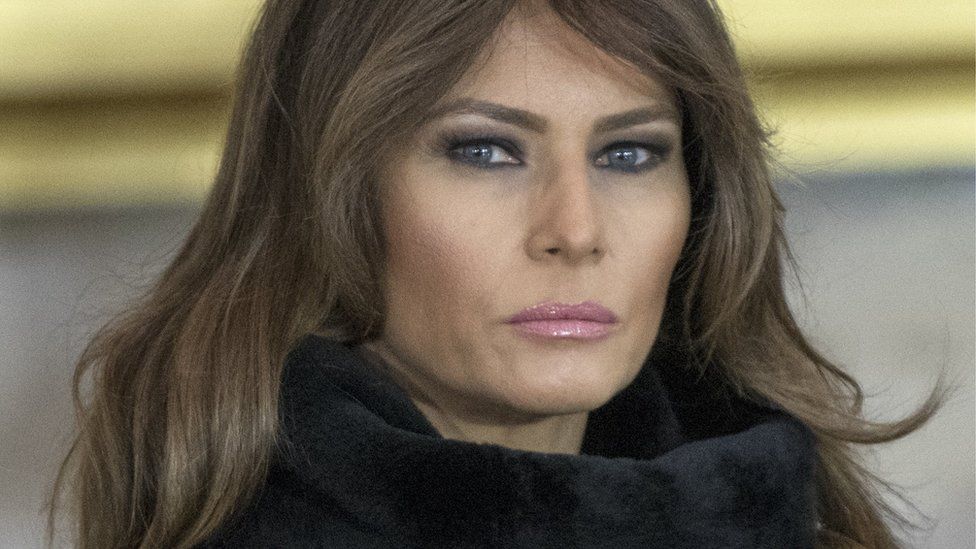What is the Einstein visa? And how did Melania Trump get one?
- Published

Melania Trump obtained US citizenship on a visa reserved for immigrants with "extraordinary ability" and "sustained national and international acclaim", according to a report in the Washington Post.
Nicknamed the "Einstein Visa", the EB-1 is in theory reserved for people who are highly acclaimed in their field - the government cites Pulitzer, Oscar, and Olympic winners as examples - as well as respected academic researchers and multinational executives.
Mrs Trump began applying for the visa in 2000, when she was Melania Knauss, a Slovenian model working in New York and dating Donald Trump. She was approved in 2001, one of just five people from Slovenia to win the coveted visa that year, according to the Post.
Becoming a citizen in 2006 gave her the right to sponsor her parents, Viktor and Amalija Knavs, who are now in the US and in the process of applying for citizenship.
The reports of how Mrs Trump obtained her EB-1 visa will rankle with some, at a time when her husband is railing against immigrants and attempting to scrap the right of new citizens to sponsor family members. And questions have been raised about her suitability for the extraordinary ability category.
But just how hard is it to get an EB-1, and should she have made the cut?
Mrs Trump came to the US in 1996, first on a tourist visa then later a string of working visas for skilled immigrants, according to her lawyer. She was working as a model in New York when she met Mr Trump at a party in 1998, a relationship that considerably raised her celebrity profile.
Before applying for a green card - which grants permanent residency - she had worked as a runway model in Europe and featured to a limited extent in UK and US magazines. She appeared on the cover of British GQ on a fur rug in Mr Trump's private jet, and in the swimsuit edition of Sports Illustrated in the US. She was not a top international model.
To obtain an EB-1 for extraordinary ability, an immigrant has to provide evidence of a major award or meet three of 10 criteria proving excellence in their field. The criteria include coverage of the applicant in major publications, original and significant contributions to a field, and work displayed at artistic exhibitions.
The government guidance for applicants cites Nobel prizes and international acclaim, but the reality is often more prosaic, said Susan McFadden, a specialist US visa lawyer at the Gudeon and McFadden law firm in London.
"You do not have to be a Nobel prize winner to get the extraordinary ability visa. I've gotten EB-1 visas for people you've never heard of and never will," she said.
"An experienced lawyer knows what the US citizenship and immigration services is looking for, and how to bring out of the client's background things that will be attractive to the agency."
What was Melania Trump like in Slovenia?
Securing an EB-1 is often about defining a field, Ms McFadden said, in the hope of proving the client is outstanding in that field. Trying to prove your client is an outstanding businessman puts them up against Richard Branson. Proving they are outstanding within alternative asset commercial finance management? Not so tough.
Ms McFadden said she had secured EB-1s for a range of diverse specialities, from coaching a specific football position to scientific ballooning. The trick was to define a field narrow enough to excel in, she said, but not too narrow that immigration authorities won't take it seriously.
But where does that leave Mrs Trump? She does not appear at the time to have excelled in a niche area of modelling, nor won awards or had her work written about in significant publications.
Her lawyer has declined to publish details of her application, so we can't know what she submitted as evidence. But she may have been boosted by high-profile testimonial letters, said Nita Upadhye, a US immigration specialist at NNU Immigration Law.
Testimonials form part of the application, and the more high-profile the reference the more weight it carries. If Mrs Trump, already dating Mr Trump at the time she applied, secured letters from luminaries in fashion, that would be significant, Ms Upadhye said.
"If you're in the acting world, and Quentin Tarantino or Steven Spielberg writes a letter saying you're the next best thing, that can be very persuasive," she said.
"It's about getting testimonials from someone who is extraordinary in their own right and has some name recognition, but who can also attest to specific achievements of the applicant. And I'm sure she probably had some pretty significant letters, maybe from Donald Trump."
Ultimately though, lawyerly creativity aside, it comes down to the applicant, she said.
"You could get a letter from President Obama, and that certainly would look impressive with his letterhead. But if he can't say something significant about your achievements, it won't cut it."
- Published26 August 2020
- Published20 January 2017